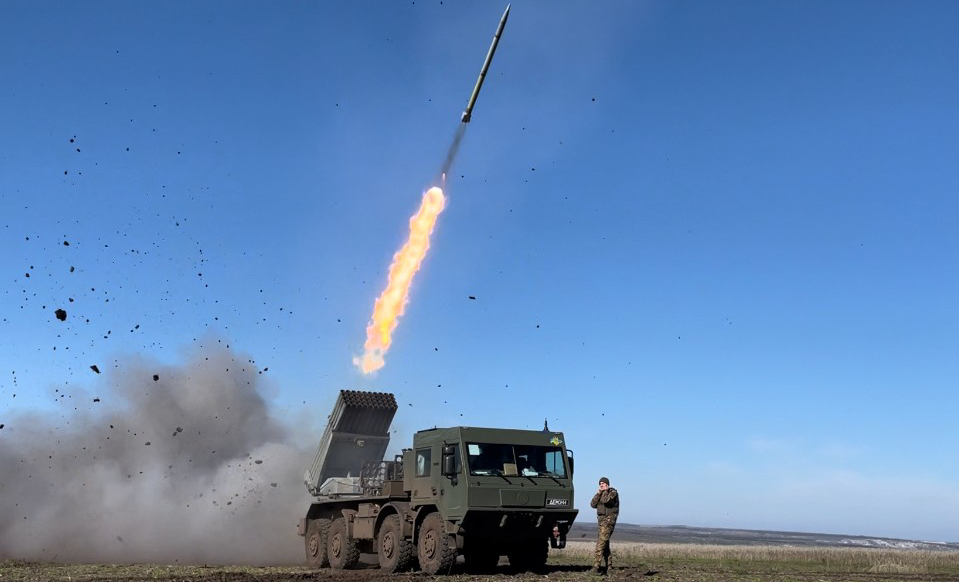
Ukrainian defense forces have recently shared a video showcasing the deployment of the Czech-made RM-70 Vampir multiple rocket launcher system, nicknamed “Bloodsucker” by Ukrainian troops.
Advertisement
The United Press Center of the Taurida Front’s defense forces shared the video. Mounted on a Tatra 8×8 truck chassis, this Czech system enables rapid movement to the firing location, execution of the firing task, and swift retreat to a secure site.
According to the MLRS crew commander, switching from a Grad MLRS to the RM-70 Vampir feels like transitioning from a “Soviet car to a foreign car.”
Based on several decades-old technologies, the Grad MLRS is still heavily utilized in the ongoing conflict. The Ukrainian and Russian Armed Forces operate this truck-mounted Multiple-Launch Rocket System (MLRS) as part of their respective arsenals.
The Grad MLRS and the RM-70 Vampir are truck-mounted rocket systems used by various armed forces. However, the RM-70 Vampir is considered a more advanced and modern version of the Grad MLRS.
Advertisement
It boasts increased accuracy, greater range, and the ability to rapidly move to fire positions and withdraw to safety. Additionally, the RM-70 Vampir can fire different types of rockets with varying guidance systems, giving it greater versatility than the Grad MLRS.
Additionally, the RM-70 Vampir has a longer range than the Grad MLRS, with a maximum range of 40 kilometers compared to 20-30 kilometers for the Grad.
The RM-70 Vampir is also more accurate thanks to its modern guidance systems, enabling it to strike precise targets with greater precision than the Grad.
Since the start of Russia’s invasion of Ukraine, RM-70 Vampir 122mm Multiple Launch Rocket Systems have reportedly been provided to Ukraine by the Czech Republic for an undisclosed amount.
At the same time, a fundraising effort was launched under the “Gift for Putin” project to get the Ukrainian military an RM-70 Vampir MLRS. The project aims to raise money to support Ukraine’s military against Russian forces.
Advertisement
The “Gift for Putin” project, started by Czech businessman Dalibor Dedek, is an effort to help the Ukrainian military acquire more weapons and equipment, including ammunition, drones, combat vehicles, tanks, and artillery systems.
In March 2023, it was reported that within a few weeks, Ukraine would receive an RМ-70 rocket launcher along with 365 missiles. This was made possible through the funds raised by the “Gift for Putin” project, which exceeded US$1.3 million.
Based on visuals shared on social media on March 10, 2023, Ukraine now possesses the latest version of the 122mm Multiple Launch Rocket System (MLRS), the RM-70 Vampir.

RM-70 Vampir Multiple Launch Rocket System (MLRS)
RM-70 Vampir is an improved variant of the RM-70 122 MLRS. The rocket launching system is designed to attack a variety of hostile targets, including infantrymen, artillery pieces, motorized infantry, tanks, and other combat vehicles.
In February 2015, the first prototype of the RM-70 Vampir was produced, and it underwent successful shooting tests in October of the same year. Excalibur Army in the Czech Republic designed and manufactured this weapon system.
The Tatra T-815-7 8×8 military tactical truck serves as the base for this weapon system. Although the fundamental layout of the rocket launcher is similar to the original RM-70, the wiring has been redesigned.
Three people can be accommodated in the crew cabin. The vehicle’s forward hull can be equipped with a hydraulically powered dozer blade for clearing obstructions and setting up firing positions.
A 40-round launcher is mounted on the back of the truck chassis, with an extra batch of 40 122mm rockets located behind the crew cab for quick reloading. The rocket launcher is 9.97m long and is lifted by air springs.

It can be operated in semi-automatic or manual modes using electronic shift control. The rocket launch can be initiated by an operator either from inside the crew cab or from a nearby shelter using a remote control device.
The MLRS is fitted with a sophisticated fire control system with a ballistic computer. Together with command and control systems, it also incorporates the global positioning system (GPS) and inertial navigation system.
When a full salvo of rockets is fired, it can impact an area of up to 70 hectares. The system can complete a launch sequence, which includes deployment, firing, and relocation, in just three minutes.
Advertisement